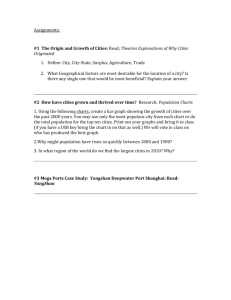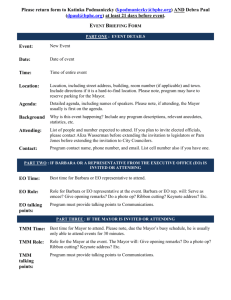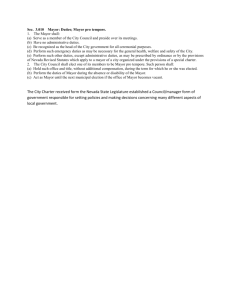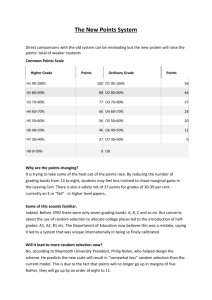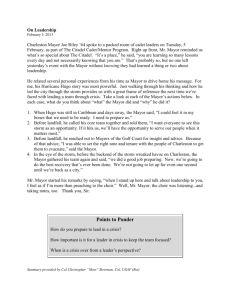Mayor - London Ed
advertisement
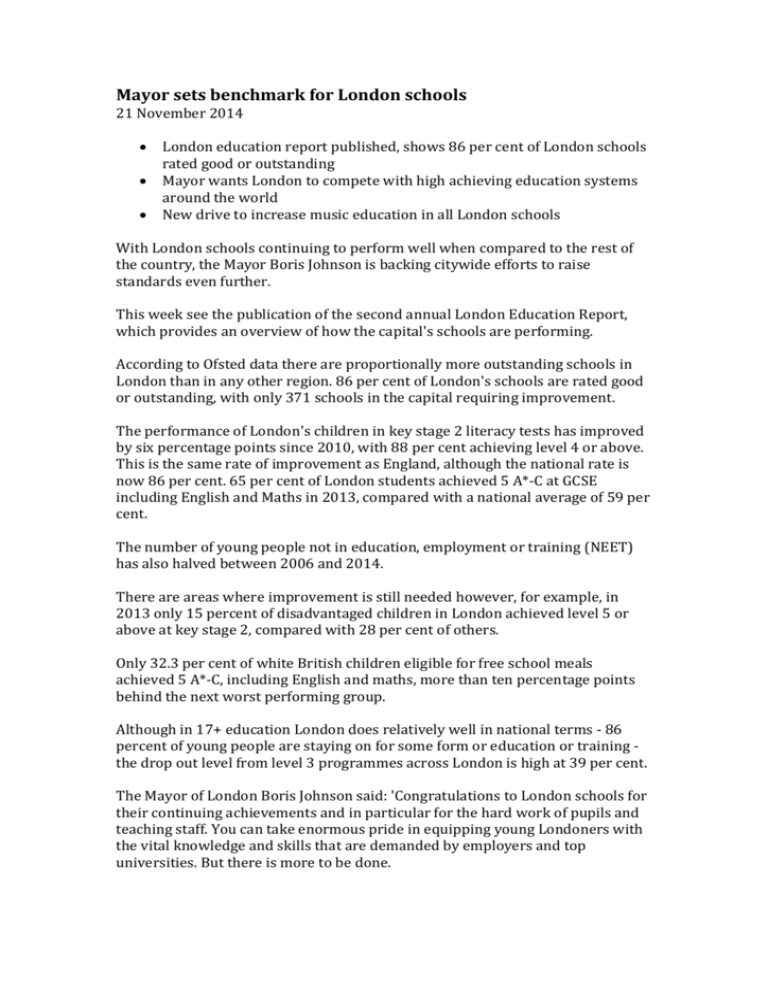
Mayor sets benchmark for London schools 21 November 2014 London education report published, shows 86 per cent of London schools rated good or outstanding Mayor wants London to compete with high achieving education systems around the world New drive to increase music education in all London schools With London schools continuing to perform well when compared to the rest of the country, the Mayor Boris Johnson is backing citywide efforts to raise standards even further. This week see the publication of the second annual London Education Report, which provides an overview of how the capital's schools are performing. According to Ofsted data there are proportionally more outstanding schools in London than in any other region. 86 per cent of London's schools are rated good or outstanding, with only 371 schools in the capital requiring improvement. The performance of London's children in key stage 2 literacy tests has improved by six percentage points since 2010, with 88 per cent achieving level 4 or above. This is the same rate of improvement as England, although the national rate is now 86 per cent. 65 per cent of London students achieved 5 A*-C at GCSE including English and Maths in 2013, compared with a national average of 59 per cent. The number of young people not in education, employment or training (NEET) has also halved between 2006 and 2014. There are areas where improvement is still needed however, for example, in 2013 only 15 percent of disadvantaged children in London achieved level 5 or above at key stage 2, compared with 28 per cent of others. Only 32.3 per cent of white British children eligible for free school meals achieved 5 A*-C, including English and maths, more than ten percentage points behind the next worst performing group. Although in 17+ education London does relatively well in national terms - 86 percent of young people are staying on for some form or education or training the drop out level from level 3 programmes across London is high at 39 per cent. The Mayor of London Boris Johnson said: 'Congratulations to London schools for their continuing achievements and in particular for the hard work of pupils and teaching staff. You can take enormous pride in equipping young Londoners with the vital knowledge and skills that are demanded by employers and top universities. But there is more to be done. “There are still too many young people falling behind, particularly from deprived backgrounds. We also need to do more to ensure all London schoolchildren are performing strongly in STEM subjects and languages, so that we can compete against the highest achieving educational systems internationally.' The last year has seen the implementation of a number of important initiatives to improve London's schooling following recommendations that came out of the Mayor's Education Inquiry (2011-2012). They include investing in the £24 million London Schools Excellence Fund, as well as the Gold Club, which both aim to raise standards in teaching and subject knowledge. The London Curriculum, designed to complement the national curriculum, supports teachers to maximise the potential of the capital's cultural institutions, heritage sites and other assets to help bring to life academic learning for pupils key stage 3. The first resources to be published focused on English, history, music, arts and geography and are set to be followed by resources focusing on STEM subjects next summer. This week, the Mayor launches a new scheme called the London Music Pledge, which aims to boost music teaching in all the capital's schools. Munira Mirza, Deputy Mayor for Education and Culture: 'London schools continue to power ahead, when compared to schools around the country. We see ourselves as competing with the success to be found in other high performing countries around the world and it is likely that if the rest of the country performed as well as London educationally, the national PISA ranking for maths and English would rise from a current position of 27th to around 17th. We are investigating whether it would be possible to get a PISA grading specifically for London, which would make it much simpler to present how well London is performing against our international competitors.' Other initiatives the Mayor has brought in include the London Schools Atlas, an online resource, which for the first time uses data to illustrate current and future patterns of demand for places at a pan-London level, rather than within boroughs alone. This helps parents and policy-makers better understand where there is pressure on places. An updated and easier to navigate version of the London Atlas with additional information is going live to coincide with the international education conference. The Mayor has also freed up public land to support the opening of 11 schools, which will provide places for around 7,300 pupils. To download the London Annual Education Report 2014 go to http://data.london.gov.uk/dataset/london-annual-education-report. To find out more about the London Music Pledge go to www.london.gov.uk/musicpledge. To view the updated London Schools Atlas go to www.london.gov.uk/webmaps/lsa.

